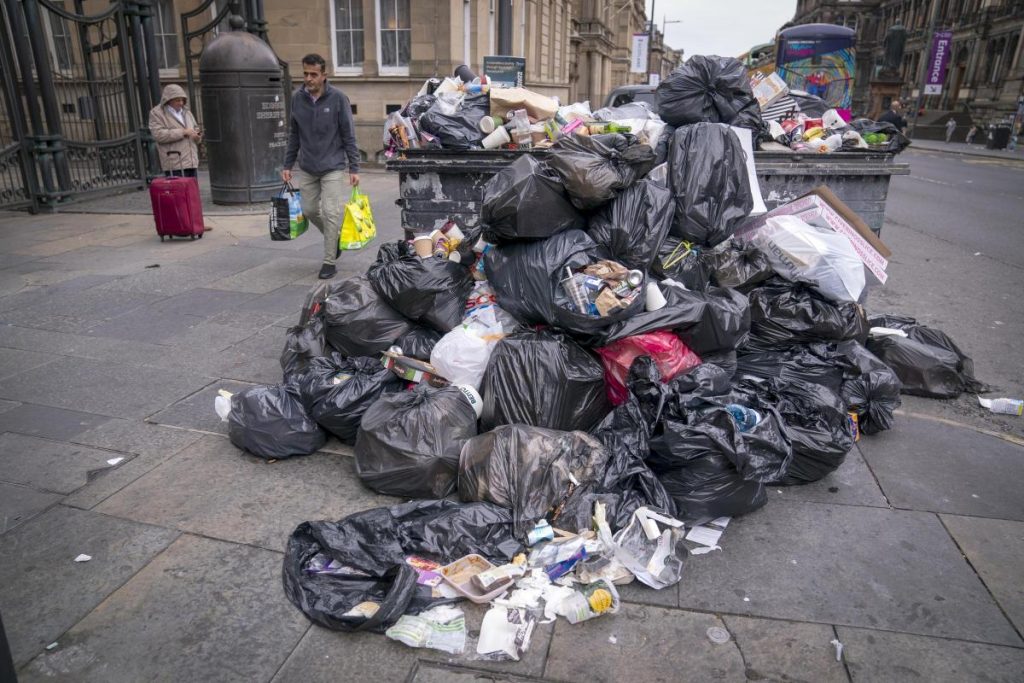London, Aug 24, (PA Media/dpa/GNA) – Scotland’s deputy first minister has said the piles of rubbish building up throughout Edinburgh are “deeply concerning” for public health.
John Swinney spoke out as unions warned the dispute over local government pay, which saw cleansing staff in the capital walk out on strike last week, could become a “winter of discontent”.
Cleansing staff in Edinburgh have been out on strike since August 18, with the action timed to coincide with the summer festivals.
But the action has now escalated, with waste workers in 13 other local authorities, including Glasgow, Dundee and Aberdeen, joining the protest while schools in some areas could be forced to close next month if staff there join the walkout.
Unions, which are demanding urgent talks with Mr Swinney, want the Scottish Government to step in and find more cash to resolve the pay dispute.
Asked about the impact of the strike in Edinburgh, the Deputy First Minister said: “I think the condition of the city of Edinburgh just now is deeply concerning on a host of levels, not least in relation to public health.
“So I acknowledge the significance of the issue which is why I want to see the industrial action resolved, why I would prefer it didn’t spread to other parts of the country.”
He stressed the Scottish Government had already provided £140 million ($165 million) to councils, with this cash helping fund the improved offer of 5%.
Scottish Labour leader Anas Sarwar, has faced accusations of failing to criticise the Labour-led Edinburgh Council over the bin strikes, after he suggested anger during last year’s Glasgow bin strike should be directed at the local council.
Asked by the PA news agency if that was a fair accusation, Mr Sarwar said: “Governments are missing in action, but I’m not in government. I would love to be in government.
“I would get people around the table, I would get Cosla around the table. I’d be getting the unions round the table and I’d be working day and night to get an answer to this dispute, not the dither, delay and disinformation we’ve seen from the SNP.”
The situation in Edinburgh is not a local dispute, he added, but rather a national dispute.
“Frankly, workers, local residents and tourists in Edinburgh deserve better than this misinformation campaign we’ve seen from the SNP,” Mr Sarwar said.
“If you want to abdicate the responsibility, fine. Get out the way. I’m more than happy to get into this position of power, and actually use the powers of our parliament for the interests of working people across this country, not using it as a political football to try and point fingers and score goals.”
However, Wendy Dunsmore, of Unite, said Scottish ministers needed to match the £1,925 pay rise being given to local government workers in the rest of the UK.
The 5% on offer will see workers in Scotland receive an average of £900 a year more she said, as she insisted the unions were “here for the long haul”.
Speaking about the protest, Ms Dunsmore told BBC Radio Scotland: “Our first wave was in Edinburgh, the second wave is waste across Scotland, our third wave is going to be schools.
“And it may not stop at schools, we’re in here for the long haul.”
She added: “Our members are demanding a better pay rise, and who knows where we are going to go next?
“We’re looking for a winter of discontent, even though we’re just approaching autumn.”
First Minister Nicola Sturgeon has already made clear the Scottish Government does not have a “bottomless pit of money” to resolve the dispute.

But Ms Dunsmore insisted ministers needed to find more cash, as she called on the Scottish Government to at least match the £1,925 pay offer that has been made to council workers in the rest of the UK.
Any rise needs to give “proper recognition that there is a crisis out there for low-paid workers”, Ms Dunsmore insisted.
She said, “our members are being offered on average of £900. That’s less than half of what is being offered elsewhere.
“Now a Tory Government is offering our workers down south nearly £2,000, I don’t think it’s a bad ask for the Scottish Government to at least match that.”
Ms Dunsmore continued, “we don’t want strikes, but it is down to the Scottish Government to stop these strikes.
“There is an impact but that’s not an impact because of the workers, that’s because there is a shortage of funding to the Scottish local authorities. This lands at the Scottish Government.”
In the Scottish capital, which has seen its streets strewn with litter and bins overflowing, council leader Cammy Day said he was “disappointed” a deal had not been reached.
“This is a national crisis playing out in Edinburgh’s streets during our busiest and most important time of the year,” he said.
“And while this clearly shows the value of our waste teams’ work, it also demonstrates a national failure to find an acceptable resolution.”
As well as the action by waste workers, the strike is set to spread to school and nursery staff in nine council areas set to go on strike next month.
Unions Unison and the GMB have said their members will walk out between September 6 and 8, a move that will see schools, early years centres and nurseries disrupted in Aberdeenshire, East Renfrewshire, Glasgow City, Inverclyde, Orkney, North Lanarkshire, South Lanarkshire and Stirling.
GNA